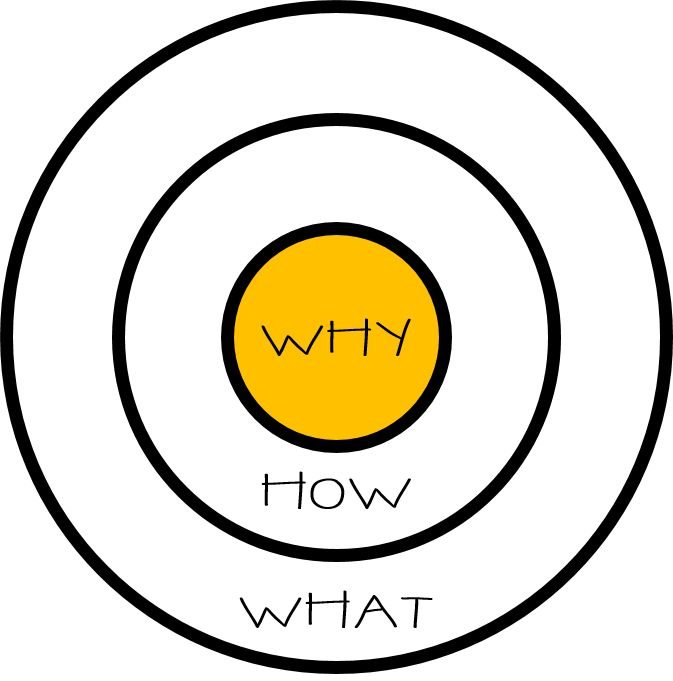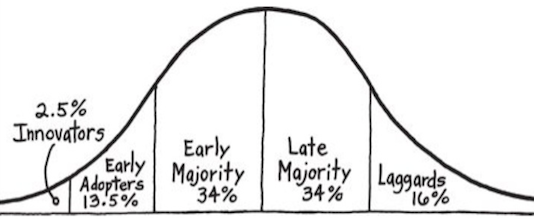Still Unsure How To Increase Your Sales?
Are you struggling to generate sales? Or get people through the front door of your shop?
Like many of us, I get so get so frustrated when I’m not able to make a sale or attract the mass to my blogs or online stores. I’ve spent so many hours trawling the internet to find ways to get loyal customers and generate more sales.
During my many hours trawling search engines, reading forums and watching videos I came across someone who has probably switched a light bulb on for me. I only discovered this person a couple of weeks ago. Some of you have most likely heard of him, but if not then I thought I would share with you all what I found. His name is Simon Sinek and what he has discovered could help us all change our fortunes.
During one of his talks a few years ago he explains about a discovery he made and how it changed his view on how the world worked.
How do some achieve their goals, make sales and generate healthy profits where others stagnate and stay where they are spinning their wheels? How are companies like Apple so innovative? Most of us would agree that they’re more innovative than their competition but if you think about it, they’re “just” a technology company building computers, laptops and handheld devices.
Think about it, Apple has the same access to talent and resources as other businesses do, but they have something different, something special and so Simon looked into this further to understand how they have become so successful.
What he found is that there's a pattern. It turns out that inspiring leaders and organisations in the world, whether it’s Apple or Martin Luther King all think, act and communicate the same way. The point is though, its opposite to everyone else!
They think and communicate differently to the majority. He explains how these leaders or successful organisations communicate. He calls it the “Golden Circle”.

WHY? HOW? WHAT?
Every single person, every organisation knows what they do. Some known how they do it, whether it’s your proposition or your USP, but very few know why they do it.
By the way, having a why isn’t to make a profit, as that’s a result. The why is to ask yourself “What’s your purpose?”, “What’s your cause?”. “What’s your belief?”, “Why does your business exist?”, “Why do you go to work in the morning to do what you do?”
Looking at the “Golden Circle” most of us start with the what, then the How and finally if we can, the Why. The reason is we go from the clearest area to the unclear and cloudy thing which is the “why”.
The inspiring leaders and successful organisations do the opposite. They all think, act and communicate from the "inside out". They start with the why.
Again, using Apple as an example. If they were like everyone else, a marketing message might sound something like this: “We create computers. They’re beautifully designed and easy to use.” Ask yourself, is that making you reach into your pockets and pull your wallet out to hand over your hard earned cash?
The thing is, this is how most of us market our ideas and products. I've been guilty of this. We say what we do, we say how we’re different or better, and we’re expecting people to buy from us.
Here’s how Apple tend to communicate: “Everything we do, we believe in challenging the status quo. We believe in thinking differently. We challenge ourselves by designing and making beautiful looking products that are simple to use. We just so happen to make great laptops and hand held devices.”
Different from the first example, right? They tend to reverse the order of the information. They start with what they believe in, the why. Because they do this, and judging by the success they’ve had, proves that people don’t buy what you do; people buy why you do it.
Let’s expand on this. The public is comfortable buying a laptop or a smart phone from Apple, but at the end of the day, they’re just a technology company. Nothing is different structurally from their competitors. Their rivals are equally capable of making stylish hand held devices, laptops, etc. but very few of them have had the success of Apple. Why is this and why do we buy from a company like Apple? The answer is people don’t buy what you do; they buy why you do it.
The goal is to do business with people who believe what you believe.
When I heard Simon Sinek say all this, a light bulb went on in my head! I had to go over what he was saying two or three times. It's made me sit up and really think how to approach marketing from a different angle.
Here’s the thing though. It's not just Simon's opinion. It’s all to do with biology. Not psychology, but biology. If you look at the brain from the top down, the human brain is broken into three components that relate entirely with the “Golden Circle”.
Our newest part of the brain, our neocortex, corresponds with the outer (what) level. The neocortex is responsible for all or our rational thought and language. The middle two sections make up our limbic brains, which are responsible for our feelings, like trust and loyalty.
It’s also responsible for human behaviour and decision making, but it has no capacity for language.
When we communicate starting from the outside and working in, people understand the vast amounts of information such as the features and benefits we give them, but it doesn't drive behaviour.
When we communicate from the inside out, starting with the why, we talk directly to the part of our brain that controls behaviour. We then allow people to rationalise it with tangible things that we say and do. This is where “gut decisions” come from.
If you give people the facts and figures, you usually get a response such as “I know all the details, but it just doesn’t feel right.” The reason it doesn’t “feel” right is that the part of the brain which controls decision making but doesn’t control language.
So based on this discovery, if you don't know “why” you do what you do, but we now know people respond to the why, then how will you ever get people to buy something from you?
The goal is not just to sell to people who need what you have; the goals is to sell to people who believe what you believe. If you talk about what you believe, you will attract those that believe in what you believe in and with that comes a loyal following.
Why is it important to attract those who believe in what you believe though? It’s called the “law of diffusion of innovation.”

The first 2.5% of our population are innovators. The next 13.5% are the early adopters, and the next 34% are your early majority. The rest of the population are the late majority and the laggards. (My Mum is a most definitely a laggard. She took forever to get a smart phone!)
We all sit at different places of the scale. What the law of diffusion of innovation tells us is that if you want to have success selling to the mass market, you're unlikely to get it until you penetrate the first 15% of the market and into the early majority population.
You see the early majority will not try something until someone else has tried it first. Those that do try things early are the innovators and early adopters. They’re comfortable making those “gut decisions” and comfortable making the intuitive decisions that are driven by what they believe in (and believing in what you do).
These are the people that stand in line for hours to get the new smart phone, or the latest gadget, even though you can purchase it by walking straight into the shop a few weeks later and with little to no crowds.
They don’t do it because the technology is great. They do it for themselves. They want to be the first. It’s what they believe in and how they want everyone to see them.
People don’t buy what you do; they buy why you do it. What you do simply proves what you believe.
Another example. Remember TiVo? It’s probably more familiar for those of you in the US.
TiVo was somewhat of a commercial failure. They didn’t make a crazy amount of money. When they went public, their stock was about $30, and then it dropped like a stone. When they launched their product, they told us what they had. “We have a product that pauses live TV, skips commercials, rewinds live TV and memorises your viewing habits.”
The cynical majority though said “We don’t believe you. We don’t need you. We don’t like it.”
What if instead they had said, “If you’re the kind of person who likes to have total control over every aspect of your life, well, we have a product for you. It pauses live TV, skips commercials and memorises your viewing habits.”
Remember: People don’t buy what you do; they buy why you do it and what you do serves as the proof of what you believe.
As I start on my journey, starting an online business, looking to generate sales, all of this information to me is simply mind-blowing.
I know Apple is mentioned a lot in the examples, and not everyone is a fan, but you can't ignore how successful they've been and how they have built a loyal following.
The message is clear. It’s those who start with the why that have the ability to inspire and create loyalty and as a result are likely to generate more sales and bigger returns.
I'm grateful I found this information and it will help me work towards more #freedom as an online #entrepreneur. I'm hoping this is of some value to you all.
-Craig
people don’t buy what you do; they buy why you do it.
The importance of values and mission is certainly of chief importance. It gives your company a soul and connects you more intimately with people, giving them a reason to be passionate about your product beyond the simple function your product serves or service you provide.
This is so true @teslalifestyle. Everyone should ask themselves why am I doing this? Why do "we" as a business or organisation do this? This has opened my eyes... Thanks for commenting.
Hey @vinnyvagus , I have started a podcast recently where I interview other entrepreneurs.
The podcast is on my youtube channel, and here is the playlist: https://www.youtube.com/playlist?list=PL5CpCNPna6p95oJfKPew0N3ZT0k-khdgg
We talk about what you are currently doing in life, your business as well as your journey and any lessons or advice you want the world to know.
A casual conversation about entrepreneurship, and, about you.
Would you be interested in appearing on the show?
If so, then it is an audio only interview and will be done over Skype.
Please go to this link and pick a time that best suits you: https://calendly.com/adriannantchev/entrepreneur-podcast
Congratulations @vinnyvagus! You have received a personal award!
Click on the badge to view your Board of Honor.
Do not miss the last post from @steemitboard!
Participate in the SteemitBoard World Cup Contest!
Collect World Cup badges and win free SBD
Support the Gold Sponsors of the contest: @good-karma and @lukestokes
Congratulations @vinnyvagus! You received a personal award!
You can view your badges on your Steem Board and compare to others on the Steem Ranking
Vote for @Steemitboard as a witness to get one more award and increased upvotes!